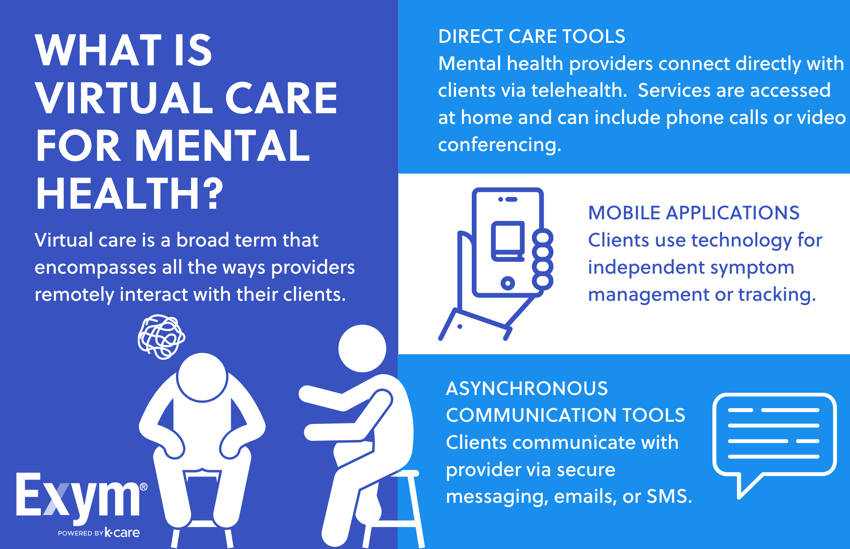Virtual care for mental health is something that’s been slowly changing and evolving over the past several years. As our technological capabilities have grown, so has the need for virtual care. Virtual care was primarily seen as something to complement in-person care until the COVID-19 pandemic made virtual care into a necessity. As people around the globe grappled with the reality of the pandemic and its significant mental health implications, providers quickly pivoted and began offering multiple forms of virtual care. For social services clinicians, mental health virtual care became the new standard of care.
What is Virtual Care for Mental Health?
Virtual care is a broad term that encompasses all the ways healthcare providers remotely interact with their clients to provide care. It does not refer to specific technologies used, or pieces of information exchanged. Providers can treat clients via telehealth, and may also use live video, audio, or email exchanges, and instant messaging to communicate with their clients remotely. This can include checking in via phone or video conference after an in-person visit, monitoring symptoms via an app, or responding to any questions via text or email that a client may have. The term virtual care is a way of talking about all the ways clients and providers can use digital tools to communicate in real-time. Virtual care is a broad term that refers to a variety of mental health services.

Direct Care Tools are the heart and soul of virtual care. They include any way a provider might connect with a client via telehealth. Some examples are activities like a phone assessment or an online therapy session.
Mobile Applications provide a way for clients to monitor symptoms at home and to share results with the provider. They include apps where clients can self-assess different issues or track symptoms over a period of time.
Asynchronous Communication Tools provide ways for clients and providers to communicate even if they aren’t online at the same time. They include secure messaging through technology like SMS, emails or other tools within a client portal.
The Future of Virtual Care for Mental Health
During the COVID-19 pandemic, virtual care for mental health was a necessity. However, the future of client care continues to evolve, and is centered around continuing virtual care.
The mental health industry is changing at a fast pace as providers look for ways to increase their patients’ access to care while reducing the cost of mental healthcare. Technology is making it easier for mental health providers to communicate with their clients and provide virtual care. It also helps break down the barriers that can impede a client’s access to mental health care. With the help of direct care tools, mobile applications and asynchronous communication tools, clients can now interact with mental health providers from any location, including the comfort of their own homes. This is especially beneficial for those who live in rural communities, who have transportation limitations, or who have physical limitations that make it difficult to travel. Mental health providers should continue to educate clients on the benefits of virtual care as it helps increase access to care and reduce costs.
Exym Behavioral Health EHR Supports Virtual Care
In March of 2021, Exym Behavioral Health EHR launched Exym Engage, a set of tools that supports remote work and virtual care. In a world where clients and staff aren’t always face-to-face in an office, providing treatment and managing all the required paperwork can be hard. Replicating the in-person experience as much as possible, Exym Engage is an all-in-one telehealth software solution that allows clinicians to move through their daily tasks from one centralized location, simplifying their workflows so they can focus on what they do best: delivering great care.
Exym's features include the ability to:
- Launch telehealth therapy sessions with clients right from the Exym screen and share documents with the client through secure messaging within the session.
- Collect intake documents and file them in clients' records electronically, with clients and their families able to sign documents from a computer or phone.
- Communicate with clients between sessions through secure messaging that doesn’t expose any staff memebers' personal phone numbers or email addresses. All communication history is saved so it can be accessed in the future.
- Clients can retrieve the records they’ve requested electronically. Telehealth and secure messaging with document exchange are powered by Mend and supported by their incredible bi-lingual support staff to help your clients with any questions!
- All of these features are covered by the HIPAA standards and compliance, access controls, and record retention.
How Does Exym Behavioral Health EHR Support Agencies?
In an ever evolving technology landscape, it’s never too late to change your EHR software to one that better fits your needs. We invite you to book a demo and speak to an Exym expert about capabilities and pricing. If you'd like to know more about the ways our other Exym tools can help your front office staff streamline operation management, visit our Operations page. We can’t wait to help you get started!
Exym is a comprehensive EHR software solution designed specifically for behavioral health agencies. Trusted for 20+ years, our intuitive and customizable software empowers providers to improve client outcomes, manage revenue cycles, and increase agency efficiency. Exym allows you to spend more time on what matters most-the clients in your care.
Tags:
Operations
May 30, 2023




Comments